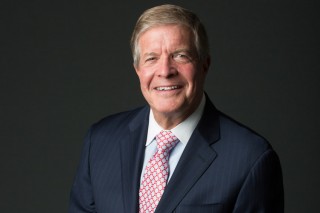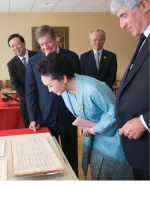Title

Joseph W. Polisi, Juilliard's sixth and longest-serving president, announced on October 5 that he intends to step down at the end of June 2018. He will have been in office for 34 years, presiding over one of the most dynamic eras in the school's history. Juilliard's board of trustees has appointed a committee led by its chairman, Bruce Kovner, to conduct the search for Polisi's successor.
Joseph W. Polisi and Bruce Kovner show a rare manuscript to China's first lady, Peng Liyuan, in September 2015, when the president announced plans to build The Tianjin Juilliard School. They're shown with Hao Ping, China's vice minister of education (left) and Cui Tiankai, China's ambassador to the U.S.
(Photo by Rosalie O'Connor)Body
During his tenure, Polisi has brought formidable gifts as public speaker, writer, and musician as well as educator, fund-raiser, and administrator to the execution of his duties as president, transforming nearly every aspect of the school. In addition, his concept of the artist as citizen has had ripple effects in arts education not only at Juilliard but around the world.
“It has been an immense honor to help lead this distinguished institution in partnership with a motivated and generous board, a brilliant faculty, a dedicated administrative staff, and extraordinary classes of highly talented student artists,” Polisi said in his announcement. “Juilliard is a place that gives back to our global society by educating new generations of artists who enhance the enduring traditions embodied in the art forms of music, dance, and drama. I know that this important mission will flourish in the time ahead.”
Kovner said that Polisi “has demonstrated an unwavering commitment to artistic and educational integrity while fostering a spirit of community and humanity at the school. For more than three decades, he has embodied and enhanced Juilliard values, elevating educational standards to include an emphasis on entrepreneurship and social responsibility. Joseph's contribution to the field of arts education is unparalleled.”
Polisi, 68, became Juilliard's president in September 1984, having served as dean of the University of Cincinnati's College-Conservatory of Music (1983–84), dean of faculty at the Manhattan School of Music (1980–83), and executive officer of the Yale University School of Music (1976–80).
A native New Yorker, he studied bassoon with his father, William Polisi (Juilliard faculty 1951–82), who was principal bassoonist of the New York Philharmonic (1943–58). Joseph Polisi holds two master's degrees and a doctorate from the Yale School of Music, and he has continued to perform as a soloist and chamber musician throughout his career. He also holds a bachelor's degree in political science from the University of Connecticut and a master's in international relations from Tufts University's Fletcher School of Law and Diplomacy. He has been awarded honorary doctorates from Yale University and eight other institutions; he also received Musical America's Educator of the Year award in 2005.
When Polisi arrived at Juilliard, it was a commuter school—there was no place to live on campus and little sense of community—and one of his priorities was to alter the physical, educational, and social landscape of the campus. He accomplished that first by revitalizing the Student Affairs Office and Health and Counseling Services and then by spearheading the construction of the Meredith Willson Residence Hall, which was completed in 1990 and which gave Juilliard's dance, drama, and music students the opportunity to live together.
Almost two decades later, Polisi oversaw another dramatic alteration: a major expansion of the Juilliard building as part of a massive Lincoln Center renovation. The project, supported by major gifts from the Irene Diamond Fund, the Peter Jay Sharp Foundation, and Bruce Kovner, was completed in 2009. It added nearly 40,000 square feet of additional space that included new classrooms, practice rooms, teaching studios, and rehearsal and performance spaces.
“The entire Juilliard community gallantly dealt with the construction dust and noise during this lengthy renovation,” Polisi recalled. “I joked that it seemed as if the construction crew kept following the Juilliard String Quartet around the building. Wherever we found a quieter spot for them to rehearse, construction noise would break out!”
But Polisi's vision for Juilliard incorporated far more than its physical plant. He expanded the curricular offerings extensively, from overhauling the Liberal Arts Department and updating the music theory and history departments to creating whole new programs—Jazz Studies (2001), Historical Performance (2009), and a Master of Fine Arts in Drama (2012). He also strengthened the Doctor of Musical Arts program, enhancing its curriculum and establishing its endowment to support tuition-free studies; broadened the school's chamber music offerings; established the Music Technology Center (now the Center for Innovation in the Arts); reconstituted the Playwrights Program; created an exchange with Columbia University and Barnard College; and oversaw the development of artist development partnerships with Carnegie Hall and the Metropolitan Opera.
During his time here, Polisi has embraced Juilliard's rich history, which stretches back to its founding as the Institute of Musical Art in 1905. In the 2005–06 season he presided over the celebration of Juilliard's centennial, which included the commissioning of more than 40 new works, among them a full-length opera by Lowell Liebermann (BM '82, MM '84, DMA '87, composition), new choreography by Eliot Feld, and symphonic and chamber works.
“It was a real joy to realize all of these commissions, which added a true energy to the building,” Polisi said. “The ramp for the Eliot Feld work is still a discussion item for anyone in the Production Department who was with us to construct this massive ‘form,'” referring to Feld's Sir Isaac's Apples, which was danced on a giant, sloped ramp.
Other areas of the school also grew significantly under Polisi's leadership. Numerous and extensive scholarship programs were added, including the Kovner Fellowships, which cover the full cost of attendance, and the Jerome L. Greene Fellowships, the first to offer full-tuition scholarships across all divisions. Polisi increased the school's touring activities, with the Juilliard Orchestra performing throughout Europe, South America, and Asia, and during the centennial season, he produced Juilliard's first tour of the United States involving all three divisions of the school. He supported the expansion of the school's library collection and the establishment of its institutional archives. The Career Services Office, now called the Alan D. Marks Center for Career Services and Entrepreneurship, embodies the president's belief that for graduates to succeed in the 21st century, they need to develop the creative, technological, and business skills required to generate their own professional opportunities.
Polisi has also been committed to broadening Juilliard's global presence, and in September 2015, in the presence of Mme. Peng Liyuan, the first lady of China, he announced plans for The Tianjin Juilliard School. In addition to offering a U.S.-accredited master's degree—a first for any performing arts institution in China—The Tianjin Juilliard School, for which Polisi serves as chairman of the board, will be open to a range of arts enthusiasts, with instrumental lessons for people of all ages and abilities, weekly public performances, and an interactive exhibit space. “I think The Tianjin Juilliard School will provide a completely new ‘window on the world' for our school,” he said. “It is certainly my hope that this project will have a positive artistic impact on China, East Asia, and Juilliard in New York.”
Last year Polisi also announced several other initiatives for bringing Juilliard to a wider world audience, including a partnership with Nord Anglia Education to create an innovative arts education curriculum for students in grades K–12 and the release of Juilliard Open Studios, a subscription-based app that provides behind-the-scenes looks at Juilliard's educational process.
Even while carrying out his myriad presidential responsibilities, Polisi has managed to find time to pursue his academic and scholarly interests. His Juilliard course, American Society and the Arts, is one of the school's most popular. He is also the author of two books. American Muse: The Life and Times of William Schuman (Amadeus Press, 2008) is the first full-length biography of Polisi's mentor, who was the fourth president of Juilliard (1945–61) and the first president of Lincoln Center (1962–68). Polisi's collection of speeches, The Artist as Citizen (Amadeus Press, 2005; revised 2016), encapsulates his philosophy that the 21st-century artist must “be an effective and active advocate for the arts in communities large and small around the globe. These artists must be not only communicative through their art, but also knowledgeable about the intricacies of their society—politically, economically, socially.” A Chinese version of the book, The Artist as Leader, was published this year by Beijing Normal University Press.
The artist as citizen concept is reflected in Polisi's establishment, in 1990, of the Music Advancement Program (MAP), an instrument-instruction program for children from backgrounds underrepresented in the performing arts, and in the school's eight community engagement programs, which bring the arts to thousands of schoolchildren, hospital patients, and nursing home residents each year while providing Juilliard students with instructional opportunities in classroom teaching and interactive performances. It can be seen in student groups like ARTReach, which organizes annual trips to help rebuild New Orleans. And it is at the core of many nonprofit organizations founded by Juilliard alumni, including Adam Driver and Joanne Tucker's Arts in the Armed Forces, Monica Yunus and Camille Zamora's Sing for Hope, Mauricio and Cynthia Salgado's ASTEP (Artists Striving to End Poverty), and William Harvey's Cultures in Harmony.
In describing the artist as citizen, Polisi noted that Juilliard prepares students for careers in the arts while encouraging active participation in political, economic, and social discourse. “It is the responsibility of all artist-citizens to use their unique talents and perspectives to effect positive change in our schools, institutions, and the world. It may very well be the arts—and artists—that provide the passion and focus needed to energize this nation as we move through the next millennium.”





